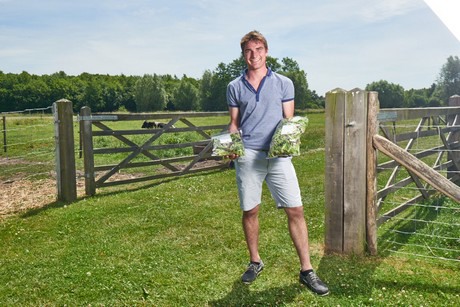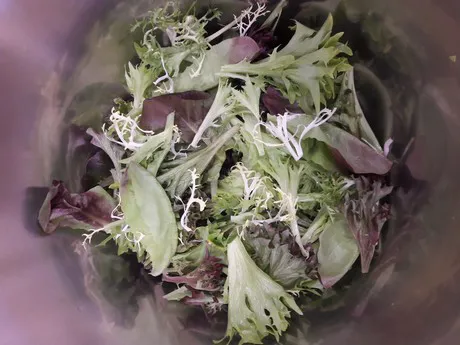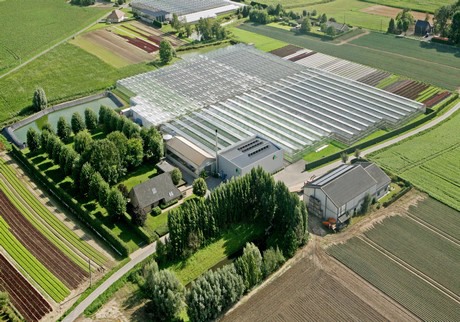It looks great: heads of lettuce in rows in various shades of green and red. As soon as the sun starts shining and temperatures start rising, Dejonghe Salads expands their production of lettuce outside, where it grows in production gutters. After some weeks, the lettuce is harvested, and the lettuce leaves the company that same day, mostly cut and packed.

More than 30 years ago, Lieven Dejonghe and his wife Bea started producing lettuce. Their sons Kristof and Olivier are to thank for the fact that the company now also cuts and packs their products. Kristof started experimenting with the production of lettuce on water in 2008, and the idea to process the lettuce in-house came soon after. Olivier: “For the new production method, we had to look for suitable varieties. We ended up with Salanova of Rijk Zwaan. This also lends itself to cutting, because the leaves can be cut loose in one cutting motion. Combined with the fact that prices at auction were no longer sufficient, it wasn’t a difficult decision.” In 2012, Kristof left the company, and Olivier set up the cutting plant. Business went well, a new warehouse was built in 2017, specifically for the cutting plant. Dejonghe Salads supplies to wholesalers and distributors, who pick up the product on the way to REO Veiling in Roeselare. Besides, Olivier also drives around near Roeselare every week as well, to supply restaurants.

Salanova mix
The different varieties of lettuce grown by Dejonghe Salads are packed in a mix. “The mix contains five varieties of Salanova, and we add frisée lettuce so that it’s a variety of colours and structures. Twice a year we visit the trial fields of the various seed companies to discover new varieties. We choose the best varieties based on colour, leaf shape, weight and production characteristics. Not all varieties grow in winter, so we then also use lettuce from France and Spain.” For major buyers, such as fellow cutting plants, the lettuce is supplied in bulk, although most of the lettuce is packed in flow-packs of 150 grammes for retail and 500 grammes for the catering industry. The labels on the bags often feature the logo of the supermarket selling the mix, at their request.
Manually cutting
Cutting happens by hand. Olivier never considered mechanically cutting. “Because we cut manually, we can make a difference regarding quality. Salanova can be cut fairly easily. A small cutting section means the edges show less discolouration. The butterhead lettuce is manually ripped, that’s a bit more labour intensive. We remove the veins, because consumers, and particularly children, don’t like to eat these.” In summer, the high season, four full-timers work on cutting the lettuce. It’s important the lettuce is stored cold during this period. Olivier: “The Salanova mix has an eight-day shelf life in summer according to the label, but when properly stored, that could be extended to ten days. In winter, the mix can be stored for seven days, that’s a bit shorter; the lettuce is softer and therefore more vulnerable, because it’s grown in greenhouses.”

Growing sales
Every year, sales increase, and that has several causes, according to Olivier. “The generation of 30-somethings are choosing convenience more often, so they prefer salad mixes over cutting the lettuce themselves. Restaurants don’t mind when the suppliers does the cutting either. Even after the so-called white register was introduced in Belgium – a system that should combat unreported employment in the catering industry – we’ve seen that this industry is glad to let cutting plants do this job.”
More information
Dejonghe Salads
Bultekotstraat 4a
8840 Westrozebeke
M: +32 (0)476 53 13 05
dejonghe@salads@gmail.com
